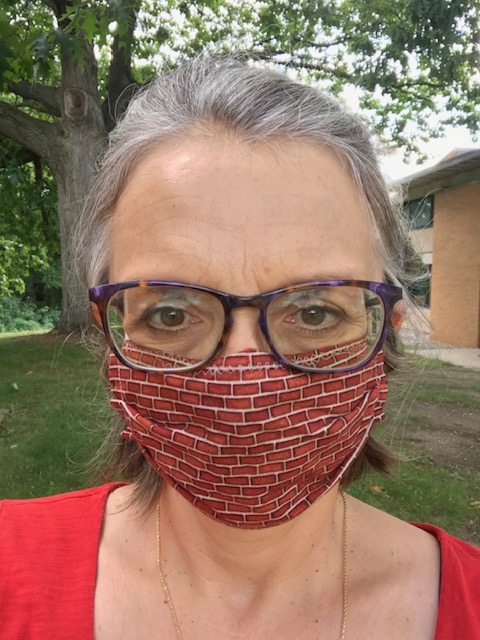I started teaching in the fall of 1989 at Lutheran Special Education Ministries (LSEM) in Detroit. I had a degree in Secondary Education with a major in English and a minor in psychology, and I’d taken a couple courses on the exceptional child, but I had no special education certification. I had at one time explored special education as a career, and my first job out of college was working as direct care staff at a group home for teenaged girls with emotional impairments, but I wasn’t really prepared for a self-contained classroom of 10 seventh-graders with diagnosed learning disabilities. I learned a lot from those kiddos; I can only hope they learned a few things from me, too.
I took a few graduate courses at the University of Detroit that year and the next when I moved to a resource room position at Lutheran High School North and Lutheran High School Northwest. And then, though my husband was thriving in a 3rd and 4th grade classroom and I was beginning to gain some skills in special ed, we abruptly changed course when our son, who lived with his mother and stepfather, relocated right before the start of kindergarten. Because we wanted to continue our frequent visits, we relocated, too. I started teaching middle school and high school emotionally impaired and learning disabled students English Language Arts in a residential school, The Manor Foundation.
While there, I took more courses toward special ed certification, this time focusing on emotional impairments. I stayed at the Manor Foundation a year and a half — until our daughter was born — and then I began ten years focusing on one, then two, then three young children at home.
When the youngest started preschool, I started substitute teaching; then when she was preparing to start first grade, I began exploring graduate school.
I landed in Michigan State University’s Critical Studies in the Teaching of English program. Writing had long been my passion — in fact, the whole time I was home with my young children, I had been working on writing projects: submitting small pieces to parenting magazines, writing devotions, songs, and chancel dramas for our church, and even writing all the content for a monthly newsletter for teachers. I felt strongly that I wanted to further explore writing and literature, but I had no idea how this one choice would impact the course of my life.
Through this program, my gaze was turned to African American literature, Native American literature, and the power dynamics that exist in writing, academics, and society. In each of my courses, I began focusing my projects on the ways language is used to assert power and gain access. The reading and writing I did for those courses laid the groundwork for the ways I have continued to grow in my understanding of academic language, home language, and the ways we navigate different settings through our use of language. I began to see the language of the home — whether it be African American Vernacular English, Spanish, or Chinese, or a mixture of many languages — as a strength and the ability to shift from that home language to the language of work or the classroom as an asset — a tool to gain access.
So, when I left MSU and taught first in a community college in Michigan and another in Missouri and began to observe my students who were struggling to make that shift day in and day out, I sought ways to provide supports and encouragement while also validating the strength of the home language. What this looks like is that rather than being the English teacher who corrects students’ grammar, I have become the teacher who instead invites variation in grammar, even trying it out playfully myself, and then modeling for students the times and places where making the shift from one language to another becomes a way to gain access and even power.
Over the next nine and a half years, both at Roosevelt High School and Lutheran North, these ideas that began to form at Michigan State became integral to my classroom. Through my collaborations with other staff members, I began to develop a strength-based approach to teaching literature and composition. My students walked in the door with strengths — their personality, their resiliency, the language that they used to navigate their lives in whatever contexts they found themselves in, and the fact that they had access to education. My job was to help them identify and articulate those strengths which often looked liked reteaching.
Some of my Black students, and some of my White and Hispanic students, reported that they spoke ‘bad English’ and they ‘couldn’t write’. Those messages are debilitating — they don’t provide a place from which to grow. In my classroom, I began to use language such as, “you use different kinds of language in different settings — the language you use gives you access to your community. Do you imagine that the language I use would give me access to your community?” When students pictured me trying to come to their homes or their neighborhoods speaking the way that I do, they could see that I would be at a disadvantage. When I played with their language, using phrases such as “See, what had happened was…” or when I asked my students to teach me slang using the strategies I used to teach ACT vocabulary, they saw me struggle to learn in the same ways that they were struggling to learn Standard English. We were all language learners; we were in this together. Students who said they ‘couldn’t write’, were affirmed by my words, “you are learning how to write.”
I wrote every assignment with them — from prewriting and journaling through revisions and final drafts. When we needed to understand a grammatical rule, we looked it up together. We practiced identifying adjectives, prepositions, and clauses in our own writing, and then we experimented with breaking the rules intentionally — for effect, to make a point, or to show emotion.
This is what gives me life — playing with language, learning how it works, breaking the rules, and showing my students that they have the power to do the same.
I didn’t get it all right. I am sure that I made mistakes such as — in the early days, insisting that my students speak Standard English in my classroom, but why? Isn’t the classroom the place where we are learning the purposes and audiences for which we need to use Standard English? where we gain the tools we need for whatever comes next? As a teacher, do I want to be the keeper of correctness or an agent of access?
I think you already know the answer to that.
I’ve spent a lifetime getting here — building this philosophy by way of special education, writing, graduate school, and hours and days and weeks and months in the classroom with students — students who come to the classroom with inherent value, built-in strength, and learned skills. Each kid I meet matters.
But many many students in Detroit and areas like Detroit, many of whom are Black, many of whom don’t speak Standard English, have received the message loud and clear that the ways that they arrive, the manner in which they dress, or wear their hair, or speak, are inadequate. They don’t match the Standard — a Standard that was created and is maintained by white people in positions of power. They’ve got to learn to match that standard, they’ve been told, or they won’t succeed. No wonder they feel angry, or rebel, or fight like their lives depend on it to deny who they are and take on what they believe will get them out of the spaces they are in. And what does that cost them?
I’m just one middle-aged white woman from Michigan, but if someone is going to give me an opportunity to step into a classroom full of kids, to play with language, to learn, and to break some rules, how can I refuse?
I’ve been preparing for this my whole life.
So, yes, I took a position in Detroit.
Yes, I’m going to be teaching English.
This decision meant saying no to my current coworkers, families, and students, no to another group of kids, and yes to another.
I’m trying to get to that. Maybe next time.
And who knows whether you have not come to the kingdom for such a time as this?
Esther 4:14




